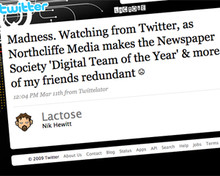
Hewitt was made redundant by Northcliffe Digital in January after four months as a multimedia specialist with the group. Before that, he was multimedia manager for Associated Northcliffe Digital for five years.
Now he has moved away from UK regional media and is focusing on social media, Pay Per Click (PPC) and SEO consultancy.
He is pessimistic for the future of newspapers: "We don't want to buy a newspaper in the evening anymore," he says, adding that that includes older generations too.
"I don't like using the words 'print is dead', but it's not very well," he adds.
"Within the industry there's a lot of resistance to the move to digital - there's so many things we can, as an industry, do to smooth the way [but] when you're looking at large institutions - Trinity Mirror, Johnston Press, Northcliffe - where regional centres are often in control of their output and also in charge of what they do with digital, these centres are naturally resistant to change, because they're very old institutions.
"They're resistant to new technology because they think 'it's only five or 10 years and this is something new, and well, print is ancient'.
"There is an audience that buys newspapers, but how long is that viable? If we don't give our information away, other people will."
As such, Hewitt applauds the Guardian's launch last week of Open Platform, its new database and open API.
Web developers 'expect' this type of open-source information now, he says: "They can take that information away, and do what they want with it and in return click through back to the Guardian site, and then Guardian can sell advertising on the back of it."
Online advertising
Newspaper advertising has never been particularly effective, he says. "Gone are the days where we say we don't know what's happening with it and people will spend the money on it."
But, according to Hewitt, the effectiveness of online advertising is equally worrying: "We know now, because we can measure it digitally, and quite frankly, it's very very poor.
But Hewitt maintains that there is still a place for established news brands.
"There's a place for good information and we trust the information we get from our newspapers," he says.
"We haven't lost the market yet. I think there'll always be a place for good reporters, for good editors. I'm not of the school that thinks because you own a blog, you're a reporter."
Advertising can be made more effective, by better use of social networks, he explains. The answer is 'getting into the niche markets and absolute demographic targeting, and communicating with your audience and customers,' he says, adding that it is about 'making the debate flow both ways and giving the user a sense of ownership'.
"We can improve advertising click-through by making it targeted, better, and receptive to the user," he says.
"Now we can deliver through so many channels, we have to exploit them all - we have to exploit Twitter; exploit Facebook."
More highly nuanced advertising knowledge should aid news organisations' understanding of what ads and content people are actually responding to, he says. "We know that people didn't follow that stuff in newspapers."
Local news systems
Despite his time with a regional publisher, Hewitt doubts there is sufficient desire and demand for local-only content to support many groups' hyperlocal plans.
"I don't know what people mean by regional, or local - the only time I personally look locally is when I'm looking for services, and the only time I use it then is through Google and keywords," he says.
The dominance of search and Google in particular in the UK makes SEO vitally important for news organisations online, he adds.
"Unless you have good SEO, you're not going to generate the click-throughs and the ad revenue on the back of it," he says.
"People are making cut backs in the wrong places, and if we don't move to the future in the way that the Guardian is, then we're going to get left behind, and in some ways the local press has been left behind.
"It wouldn't surprise me if within the next three years at least 50 per cent of local titles are just printed in one large area, with an insert put into them that tries to make them as local as possible," Hewitt predicts.
Free daily newsletter
If you like our news and feature articles, you can sign up to receive our free daily (Mon-Fri) email newsletter (mobile friendly).









